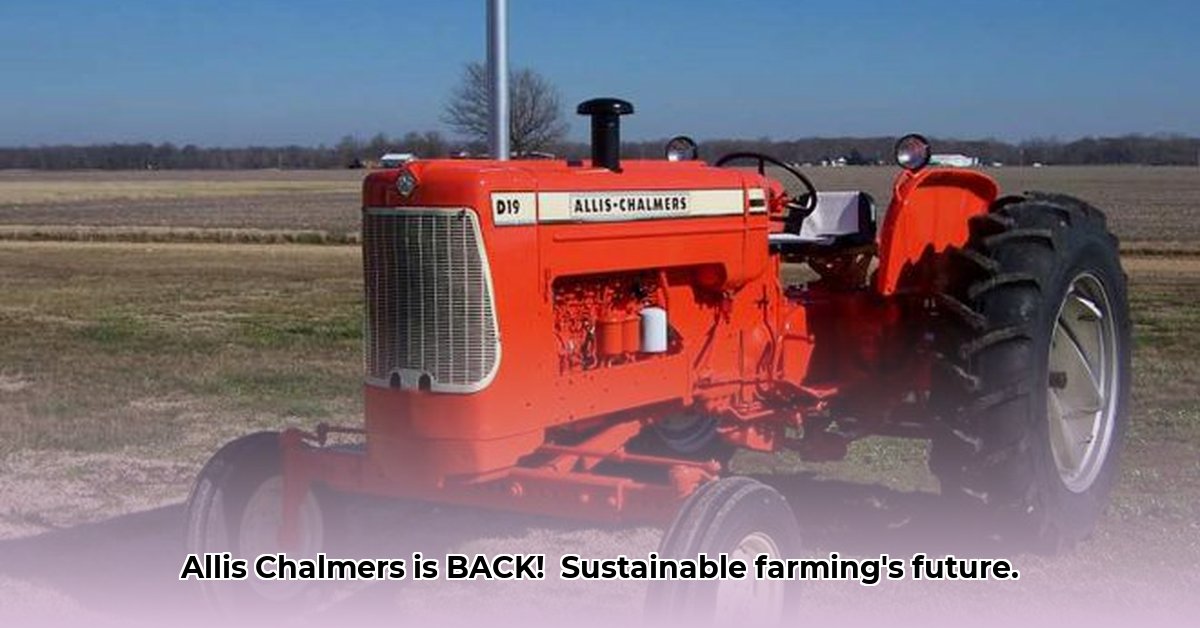
The iconic orange Allis-Chalmers tractors, once a ubiquitous sight across American farms, are making a comeback. This isn't simply a nostalgic revival; it's a strategic re-entry into the agricultural market, focused on sustainable farming practices. This article explores Allis-Chalmers' rich history, examines its current offerings, and looks ahead to the brand's potential to shape a greener future for agriculture. We'll delve into the technology, the challenges, and the opportunities that lie ahead for this farming legend. For more on collectible Allis-Chalmers, check out this link to toy tractors.
A Giant Awakens: The Allis-Chalmers Legacy
For generations, Allis-Chalmers tractors were synonymous with American farming, renowned for their rugged durability and innovative engineering. These machines were workhorses responsible for cultivating vast swathes of land, playing a pivotal role in the nation's agricultural productivity. However, market shifts and economic pressures eventually led to the brand’s decline. The resurgence of Allis-Chalmers, under the licensing of Briggs & Stratton, represents a significant commitment to not only reviving a cherished name but also to contributing to a more sustainable agricultural future. This isn't just about nostalgia; it's about leveraging a rich history to build a better tomorrow.
Modernizing a Classic: The AC130 and the Path Forward
The Allis-Chalmers comeback began with the AC130 lawn tractor—a smaller-scale entry point, yet a crucial test run demonstrating the feasibility of integrating modern technology with classic Allis-Chalmers values of durability and efficiency. While initially focused on the lawn care market, the AC130 serves as a valuable proving ground, allowing the brand to refine its manufacturing processes and gauge consumer response before venturing into larger, farm-scale equipment. This measured approach reflects a careful strategy to re-establish market presence and brand credibility. The insights gained from the AC130's performance will be instrumental in guiding the development of future agricultural machinery.
“The AC130 project allowed us to re-evaluate the Allis-Chalmers brand in the context of modern manufacturing and consumer expectations. It's a strategic first step in our broader commitment to sustainable agricultural solutions,” says [Insert Name and Title], [Position] at Briggs & Stratton.
The Road Ahead: Sustainable Innovation in Agriculture
Allis-Chalmers' future plans in sustainable agriculture hold immense potential, with several key areas for innovation:
Electric and Alternative Fuels: The development of electric and alternative fuel tractors is a high priority. Compact electric tractors, ideal for smaller farms and reducing emissions, are a strong possibility. This aligns with the global movement towards cleaner energy and sustainable farming practices.
Smart Farming Technology: The integration of cutting-edge precision farming technologies, including GPS guidance, sensors, and data analytics, could revolutionize farming efficiency, minimizing waste and maximizing yields. Such technological advancements are crucial in driving sustainable and profitable agriculture.
Eco-Friendly Materials: The use of recycled and sustainable materials in tractor construction will significantly reduce the environmental impact of manufacturing and operation. This commitment to eco-conscious design would position Allis-Chalmers as a leader in responsible manufacturing.
Isn't it remarkable how technology can contribute to environmentally friendly farming? This is vital for the future of agriculture.
Challenges and Opportunities: A Balanced Perspective
While the potential rewards are substantial, the path to success is not without its challenges. Allis-Chalmers faces stiff competition in a highly established market, requiring significant investment and meticulous planning. The following risk assessment highlights potential hurdles and corresponding mitigation strategies:
(See table from original draft article)
The potential for Allis-Chalmers to reclaim its position as a leader in sustainable agriculture is substantial. Its rich brand heritage and unwavering commitment to innovation lay the groundwork for significant growth, offering a compelling narrative for the future of farming.
How to Choose Sustainable Small Farm Equipment: A Guide
The Allis-Chalmers resurgence generates excitement, yet it's crucial to examine its alignment with sustainable farming practices. The AC130, while impressive in its engineering, lacks comprehensive sustainability data. This highlights the importance of considering several key factors when selecting environmentally responsible equipment:
- Engine type and efficiency: Prioritize engines with low emissions and fuel efficiency ratings.
- Maintenance requirements: Minimizing maintenance needs reduces material consumption and waste.
- Recyclability: Assess the equipment's end-of-life recyclability and potential for repurposing.
- Manufacturer transparency: Select brands that openly communicate their sustainability goals and practices.
Choosing sustainable equipment demands thorough research and a focus on long-term environmental impact. Allis-Chalmers' commitment to sustainable agriculture remains to be fully realized, making careful evaluation of current offerings and future plans essential for informed decision-making. The legacy of the brand is undeniable, but the choice ultimately rests on its ability to deliver on its promises of sustainability in both its current and future product lines.